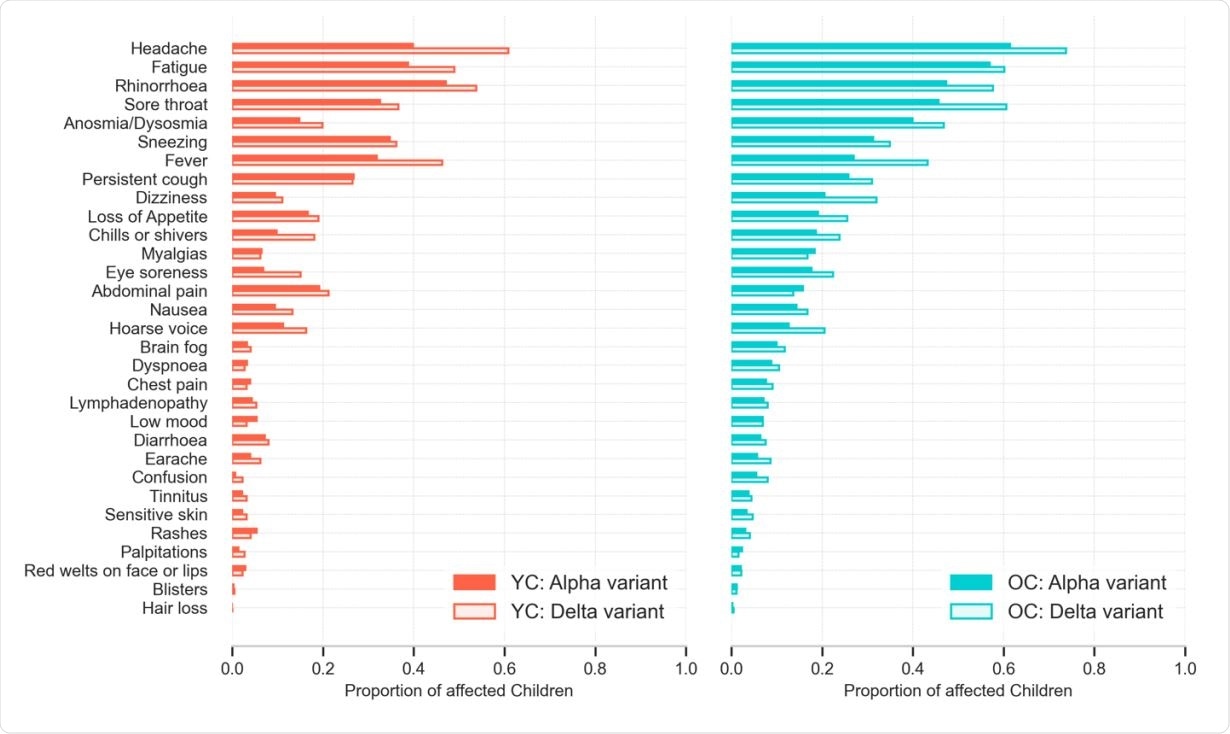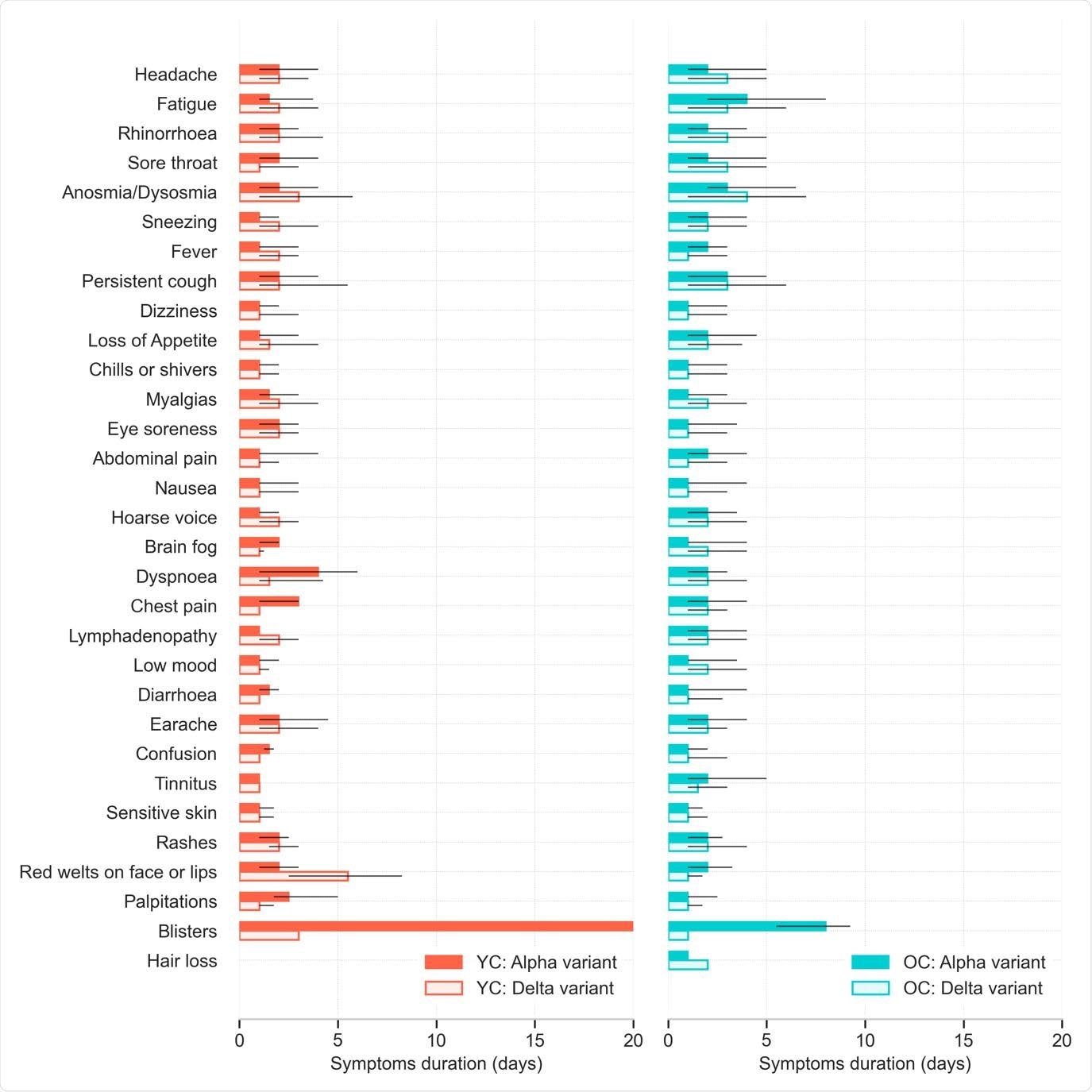Children are not at risk for more severe COVID-19 disease with Delta compared to earlier severe acute respiratory syndrome coronavirus 2 (SARS-CoV-2) variants, finds a new medRxiv* preprint study. In the first large-scale epidemiological study comparing SARS-CoV-2 infection between variants in children, researchers found children were more likely to be as sick from Delta as they would be if they were infected with the Alpha variant.
In May 2021, the Delta variant overtook Alpha as the predominant SARS-CoV-2 strain in the United Kingdom. Later in the summer, the United States experienced coronavirus cases from both vaccinated and unvaccinated individuals due to the Delta variant.
New data suggests most children experienced COVID-19 symptoms for less than two days and short durations of illness. Only a few children required hospitalization.
The study may help inform if children are in urgent need of vaccinations. “Our study adds quantitative information around the manifestation of infection due to the Delta variant in children, which will contribute to the ongoing debate regarding the role of vaccination in children, particularly for younger children,” concluded the research team.
How they did it
Emma L. Duncan of King’s College London in the United Kingdom and her team compared the severity of symptomatic COVID-19 infections in children between 5 and 17. The study took place between December 28, 2020 (when Alpha was dominant) and July 8, 2021 (when Delta was dominant).
The researchers assessed the differences in symptoms, how long symptoms lasted, and the severity of symptoms. They also measured how many children required hospital admittance and how many remained infected after 28 days.
Overall, there were 276 children between the ages of 5 to 11 and 418 children between 12 to 17 years infected with the Alpha variant.
Likewise, 227 children between 5 and 11 and 479 between 12 to 17 were infected with the Delta variant.
Children tended to recover from COVID-19 symptoms in less than a week, regardless of variant
Illness profiles were similar between children infected with Alpha or Delta.
With either variant, most children recovered in less than a week (median of 5 days). By age, younger children (5-11) tended to recover after 4 days, and older children managed to recover after 6 days.
Overall, 5 younger and 22 older children took more than 28 days to recover from COVID-19 illness. No new symptoms arose in children who experienced a more prolonged infection.

Prevalence of symptoms reported over the course of illness (to 28 days) in younger (5–11 years) and older (12–17 years) children with COVID-19 during periods of SARS-CoV-2 Alpha or Delta variant predominance.
Younger children infected with Alpha experienced blisters that lasted the longest than other COVID-19 symptoms. However, the chances of developing blisters were extremely low, about 1%.
Similar symptom profiles between SARS-CoV-2 strains
Younger children reported similar symptoms with either variant including, a runny nose, headache, and fatigue.
Older children infected with Alpha were more likely to experience headaches, fatigue, and a runny nose. In contrast, older children infected with Delta reported more headaches, sore throats, and fatigue.
Seven COVID-19 symptoms were shared between both variants — headache, fatigue, fever, loss of smell and/or taste, sneezing, runny nose, and sore throat.
Symptoms more common with Delta than Alpha included fever, dizziness, “chills or shivers,” eye soreness, and a hoarse voice.

Median duration and IQR of each symptom reported over the course of illness in younger (5–11 years) and older (12–17 years) children with COVID- 19, whose illness lasted <28 days, during periods of SARS-CoV-2 Alpha or Delta variant predominance.
Few children required hospitalization for severe COVID-19 infection
Only a few children required hospitalization with either variant.
About 2.2% of younger children and 1.9% of older children infected with Alpha presented at the hospital.
In the Delta group, 3.5% of younger children and 1.7% of older children were hospitalized.
Study limitations
The research team notes that school disruptions from lockdown may have affected school and school bus exposure rates. Additionally, their data may have been affected by lifting the United Kingdom’s national lockdown on March 29, 2021.
The end of lockdown altered the prevalence of SARS-CoV-2 and other respiratory viruses, with an increase in flu rather than SARS-CoV-2 being reported at the start of the school year. Seasonal differences may also influence the circulation of respiratory viruses such as seasonal allergic rhinitis that may present with similar symptoms.
Consequently, a lack of simultaneous testing suggests a possibility of coinfection from other respiratory viruses.

 This news article was a review of a preliminary scientific report that had not undergone peer-review at the time of publication. Since its initial publication, the scientific report has now been peer reviewed and accepted for publication in a Scientific Journal. Links to the preliminary and peer-reviewed reports are available in the Sources section at the bottom of this article. View Sources
This news article was a review of a preliminary scientific report that had not undergone peer-review at the time of publication. Since its initial publication, the scientific report has now been peer reviewed and accepted for publication in a Scientific Journal. Links to the preliminary and peer-reviewed reports are available in the Sources section at the bottom of this article. View Sources
Journal references:
- Preliminary scientific report.
Molteni E, et al. Illness characteristics of COVID-19 in children infected with the SARS-CoV-2 Delta variant. medRxiv, 2021. Doi: https://doi.org/10.1101/2021.10.06.21264467, https://www.medrxiv.org/content/10.1101/2021.10.06.21264467v1
- Peer reviewed and published scientific report.
Molteni, Erika, Carole H. Sudre, Liane Dos Santos Canas, Sunil S. Bhopal, Robert C. Hughes, Liyuan Chen, Jie Deng, et al. 2022. “Illness Characteristics of COVID-19 in Children Infected with the SARS-CoV-2 Delta Variant.” Children 9 (5): 652. https://doi.org/10.3390/children9050652. https://www.mdpi.com/2227-9067/9/5/652.